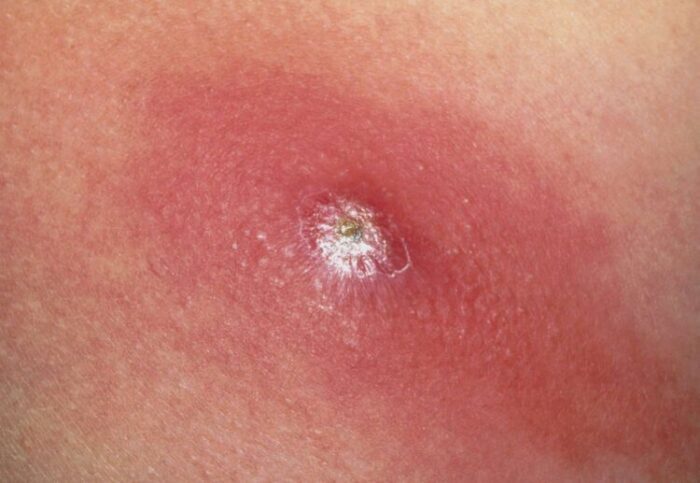Boils are painful, pus-filled bumps that develop under the skin when bacteria infect and inflame one or more hair follicles. They often look like swollen red bumps on the skin that are tender to the touch. Common places for boils to appear include the face, neck, armpits, shoulders, and buttocks. In this article we talk about What Is Your Body Lacking When You Get Boils.
Getting boils can be a sign that something is off balance in your body. Here are some key nutrients and factors your body may be lacking if you develop boils frequently:
Table of Contents
Zinc

Zinc is an essential mineral that plays a vital role in immune health and inflammatory response. This mineral helps control infection-causing bacteria and regulates the activity of white blood cells that fight illness. When you are deficient in zinc, it can impair your immune system’s ability to heal wounds, fight bacteria invasions, and resolve inflammation properly. This makes you more vulnerable to bacterial infections in hair follicles – which then manifest as painful boils on the skin. Boosting your zinc intake through foods like oysters, beef, pumpkin seeds, and chickpeas can help prevent recurrent boils.
Vitamin C
Vitamin C is crucial for collagen production, wound healing, and immune health. When you lack adequate vitamin C, it can slow down skin cell regeneration and weaken your immune defenses. This makes it easier for pathogens like Staphylococcus aureus to penetrate deep into hair follicles and cause an infection. Getting sufficient vitamin C from citrus fruits, bell peppers, broccoli, strawberries and other dietary sources helps maintain skin integrity, heal wounds faster after shaving or hair removal, and resolve boils quicker.
Vitamin A
Like vitamin C, vitamin A plays a key role in skin health and immune function. It maintains the integrity of your skin cells and mucous membranes as a barrier to keep bacteria out. Vitamin A also regulates the immune response to pathogens and aids wound healing. Poor vitamin A status impairs these protective mechanisms, allowing bacteria an entry point through damaged skin into the hair follicles to cause boil formation. Consuming vitamin A rich foods like sweet potatoes, carrots, spinach, and red bell peppers can optimize skin cell turnover and immune defenses to prevent recurrent boils.
Vitamin D
Also known as the “sunshine vitamin”, vitamin D is both a nutrient and hormone that regulates immune function and inflammation. Deficiency in this fat-soluble vitamin is associated with a higher risk of bacterial infections, including Staph infections linked to boils. This is because vitamin D plays a vital role in controlling inflammation and enabling immune cells to fight pathogens. Getting sufficient vitamin D from safe sun exposure, fatty fish, eggs, and vitamin D-fortified foods helps maintain defenses against bacteria that can infect hair follicles and lead to boil development.
Blood Sugar Imbalance
When you have uncontrolled high blood sugar levels – as seen in those with diabetes or prediabetes – it can raise your risk of developing boils frequently. Elevated blood glucose causes inflammation and impairs immune defenses, making it easier for bacteria to grow out of control and penetrate deep into the skin to infect hair follicles. High blood sugar also slows wound healing, causing boils to become larger, last longer, and potentially spread infection. Keeping blood sugar levels balanced through a healthy diet, exercise, medication if necessary, and managing stress can help prevent recurrent boil outbreaks.
Poor Circulation
Poor circulation or blood flow in the body can decrease oxygen supply to your skin cells and tissues. This creates an optimal environment for Staph bacteria to multiply quickly. These bacteria releases toxins that further damage skin cells and make it conducive for an infection to take hold when a hair follicle is compromised. Boosting blood circulation through regular exercise, staying well hydrated, dry brushing, or getting a massage helps deliver immune cells and infection-fighting substances to the skin to prevent bacterial overgrowth in hair follicles.
Stress and Fatigue
High stress levels and fatigue can take a toll on your immune system over time, making you more susceptible to all kinds of infections – including boils. Stress causes systemic inflammation and raises cortisol levels, which hampers immune cells’ ability to respond to pathogens. Exhaustion or lack of sleep has also been shown to weaken immune function. This combination of high stress and fatigue disrupts your body’s ability to resolve minor skin infections, allowing bacteria to penetrate deep into hair follicles and develop into painful boils in those areas. Managing emotional stress through meditation, exercise, or speaking to a therapist can help. Getting enough sleep gives your body the rest it needs to heal infections and regulate immunity.
Inadequate Hygiene
Failing to properly clean your skin on a regular basis allows bacteria like Staphylococcus aureus to accumulate in hair follicles and cause infection. Not showering after activities where you sweat heavily enables bacteria to rapidly multiply on skin and penetrate into open pores and hair follicles. The bacteria can then cause boils by infecting the hair follicle and oil glands within it. Practicing good hygiene by bathing regularly, washing your hands often, and avoiding sharing personal items like towels or razors limits bacterial growth on the skin and prevents boils from developing.
Hormonal Imbalances
Hormonal disorders like polycystic ovarian syndrome (PCOS), diabetes, low testosterone in men, and fluctuating estrogen in women can impair immune function and raise infection risk. The hormonal imbalances can increase inflammation, hinder wound healing, and disrupt skin cell regeneration as well. This combination provides the perfect environment for opportunistic bacteria like Staphylococcus to infect hair follicles and surrounding tissue – resulting in recurrent boils. Correcting any hormone imbalances through medication, supplements, dietary changes, or lifestyle adjustments may help prevent boil breakouts.
Poor Diet
Eating a diet high in inflammatory foods like sugar, refined carbs, alcohol, and processed meat can create systemic inflammation in your body. This allows bacteria an entry point when your immunity is compromised and skin barrier integrity falters. Not getting enough fiber, antioxidants, or essential nutrients because of a nutrient-poor diet also negatively impacts immune defenses and skin cell regeneration. Switching to an anti-inflammatory diet rich in vegetables, fruits, lean proteins, nuts, seeds, and omega-3s provides vital macro and micronutrients to heal infections faster and strengthen immunity to avoid recurrent boils.
Key Takeaways
In summary, people who suffer from frequent or recurrent boils often have an underlying deficiency that allows bacteria to take hold and infect hair follicles with ease. Boosting key nutrients like zinc, vitamins C, D & A, and balancing blood sugar levels, circulation, hormones, hygiene, and diet provides a multilayered defense against these painful skin infections.
Seeking testing and treatment from a doctor can identify any specific nutritional deficiencies or health issues that need correction as well. This combined approach helps treat the root causes making you susceptible to boils while also managing symptoms when they appear. Paying attention to your body’s signals through boil breakouts prompts you to pinpoint what needs to be brought back into balance so you can maintain glowing skin and a strong immune system. I sincerely hope you find this “What Is Your Body Lacking When You Get Boils?” article helpful.

With over 5+ years of experience in pest control and a PhD in Entomology, our author brings a blend of scientific knowledge and practical expertise to Pestifier.com. Passionate about creating pest-free environments, they provide effective tips and strategies for managing and preventing pest infestations. Connect on Facebook for the latest updates and insights.

